Delta 10 Products
In the past several decades, researchers have uncovered more about cannabis than any of us could have anticipated–different types of THC, known as isomers.
And some of these isomers present a legal way to get high; today, we’re talking about delta-10.
Over the past few decades, delta-9 THC has been the most popular THC isomer, since it’s the compound most prevalent in marijuana. And only until recently, delta-9 was the only THC isomer that most individuals even know about.
With the passing of the 2018 Farm Bill, however, hemp-derived products are federally legal as long as they contain less than 0.3% delta-9 THC. And because THC isomers such as delta-10 can be converted from CBD, this legal loophole has created an opportunity for new cannabinoids; in 2020, it was delta-8. In 2022, delta-10 is the new kid in town.
Like delta-8, delta-10 can be converted in a laboratory from CBD or CBGA through a process known as isomerization.
In order to make CBGA into delta-8, hemp extract is refined so that only 98% CBD is what’s left. Then, the CBD is combined with a non-polar solvent like heptane. When this becomes a solution, an acid reagent is added, which catalyzes the conversion into delta-10.
From that point, the solution is stirred continuously for 3 hours (usually automated) before being neutralized and purified to remove any unwanted residue.
Then, the batch is tested through chromatography to ensure that no unwanted chemicals are present and that the product is pure.
Does Delta-10 Make You High?
As a form of THC, delta-10 is psychoactive, which means it can indeed get users high.
However, a high created from delta-10 is known to be comparably more mellow than the delta-9 you may understand from cannabis. What’s more is that, according to users, delta-10 tends to create more of a low-key cerebral high than a full-body high.
It’s been theorized that this discrepancy involves the CB1 receptors in the body, which delta-10 has a lower affinity for. It’s also worth noting that users often compare delta-10 to Sativa strains of cannabis due to its uniquely uplifting, almost energizing quality.
How Will Delta-8 Make Me Feel?
When we distinguish the effects of different THC isomers, it helps to compare their potency levels.
For instance, delta-9 THC possesses a powerful affinity for CB1 receptors. Hence it’s the most psychoactive. Delta-8 falls behind delta-9 as half as potent, and delta-10 is slightly less potent than delta-8.
In other words, delta-10 is the least potent, but there’s more to potency than just a good high.
When taken in high concentrations, delta-9 THC can lead to unwanted side effects, physically and mentally, with symptoms like anxiety, lethargy, paranoia, and “the munchies.”
Although such side effects can occur from delta-8 and delta-10, reports from users on such side effects have been few and far between, so if you’re looking for a cannabinoid that can fuel your creativity and focus, delta-10 might be the way to go.
Is Delta-10 Legal?
As with delta-8, delta-10 products are legal–at least federally.
This is because virtually all delta-10 products are sourced from hemp. This has been a big deal since the passing of the 2018 farm bill officially legalized hemp and hemp products in the US.
Ultimately, this is where much of delta-10’s appeal comes from: customers who live in states with bans on cannabis can buy delta-10 products since they’re sourced from hemp rather than cannabis. And in the farm bill, industrial hemp is defined explicitly as a cannabis Sativa plant with a delta-9 concentration that’s less than 0.3% delta-9 THC.
With that in mind, it’s essential to know that some states have taken it upon themselves to ban delta-10, as has been the case with delta-8. And as a result, delta-10 vendors won’t ship to certain states if that state’s laws are deemed too vague.
Be sure to check a company’s website to see the states they ship to, but generally, you won’t be able to buy delta-10 if you live in the following states:
● Alaska
● Arizona
● Arkansas
● Colorado
● Delaware
● Idaho
● Iowa
● Mississippi
● Montana
● Rhode Island
● Utah
Also, note that delta-10 THC could still potentially cause users to fail a drug test since most kits can’t determine whether you know you need to undergo any kind of drug testing. Therefore, if you anticipate having to take any type of drug test in the near future, you should avoid using delta-10 THC products altogether.
Delta-10 vs Delta-9
Just like any other THC isomer, Delta 10 THC has a double electron bond, and as you can note from its name, delta-10’s double-bond is on the tenth carbon atom.
While research on delta-10 is in its infancy, anecdotal evidence has suggested it has an effect that’s elevating and euphoric, coupled with an enhanced sense of focus and creativity.
Widely considered the “classic” THC isomer, delta-9 is known to have the most intoxicating impact of the three THC types. Interestingly, delta-9 is also the easiest to extract, with effects depending on the cannabinoids and terpenes it contains. You may use it to relieve pain or simply relax and enjoy it. Delta-9 THC is recognized to have the most substantial impact on pleasure, thinking, and cognition.
The potent psychoactive effects of cannabis lead individuals to lose focus, which is an issue for those who need it to maintain a high quality of life. Delta 9 products are so potent that it’s sometimes to a fault, as some users experience adverse side effects. While some users feel a heightened sense of hunger, others have felt anxious or paranoid or a combination of side effects.
Delta-10 vs Delta-8
Delta-8 THC is one of many compounds in the cannabis Sativa plant, known as cannabinoids.
Cannabinoids have garnered a reputation for providing an array of different sensations–typically calming and sometimes with mild euphoric effects, specifically with THC isomers.
As an isomer of THC, delta-8 produces a similar high you might experience from delta-9, which is the main THC isomer in marijuana.
However, delta-8 THC is not as potent as delta-9, and while the high is more mellow, the side effects usually will be, as well.
Delta-10 THC is one of several different cannabinoids that are found naturally occurring in cannabis plants but typically in low concentrations. Because of this, Delta-8 is usually manufactured through an expensive extraction process.
Delta-8 works on the body and mind through specific interactions with your body’s natural endocannabinoid system.
There, it’s theorized that THC binds to CB1 and CB2 receptors in the brain–both delta-8 and delta-10 alike.
And although the two THC isomers provide a slight buzz with some chill-inducing properties, delta-8 and delta-10 are notably less potent than delta-9 THC. This feature with both delta-10 and delta-8 THC is especially appealing for those too sensitive to traditional cannabis.
And while delta-8 and delta-10 possess similar potencies, delta-8 provides a soothing experience and a mildly euphoric high, while delta-10 can create the same euphoric rush but with uplifting and energizing effects.
As mentioned before, delta-8 THC affects the body and mind by binding with the CB1 and CB2 receptors in your brain. This is interesting to researchers because the body’s endocannabinoid system has receptors that regulate different processes such as mood, sleep, appetite, and others.
Showing all 15 results
-
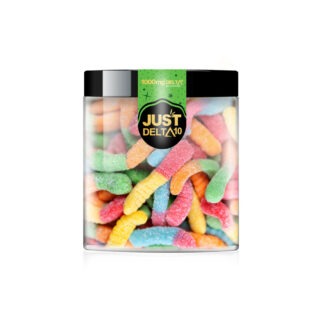
1000mg Delta 10 Gummies THC Sour Worms
$45.00 Add to cart -
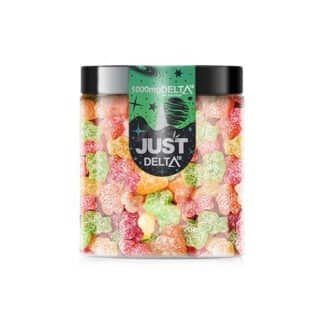
1000mg Delta 10 THC Sour Bear Gummies
$45.00 Read more -
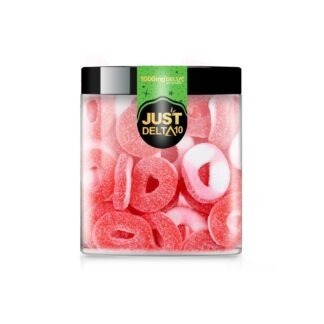
1000mg Delta 10 THC Gummies Watermelon Rings
$45.00 Add to cart -
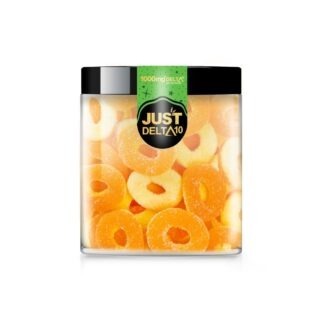
1000mg Delta 10 THC Peach Rings Gummies
$45.00 Add to cart -
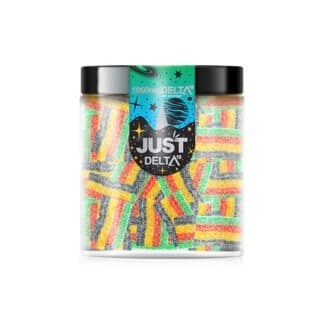
1000mg Delta 10 THC Rainbow Belts Gummies
$45.00 Read more -
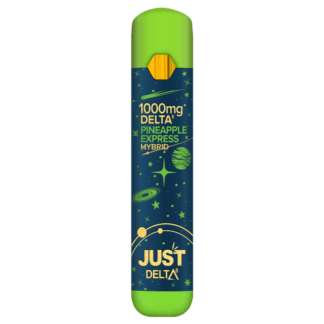
1000mg Timewreck Delta 10 THC Disposable
$29.99 Read more -
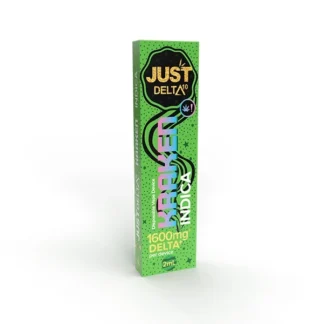
1600mg Kraken Delta10 THC Disposable Vape
$29.99 Add to cart -

1600mg Pineapple Express Delta10 THC Disposable Vape
$29.99 Add to cart -
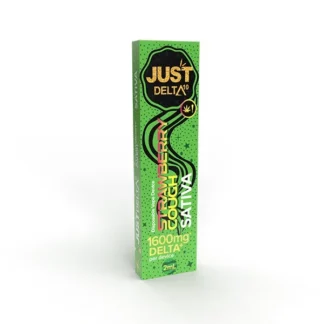
1600mg Strawberry Cough Delta10 THC Disposable Vape
$29.99 Add to cart -
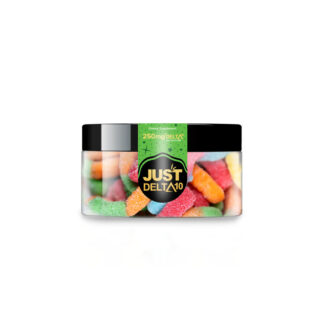
250mg Delta 10 Gummies THC Sour Worms
$24.99 Add to cart -
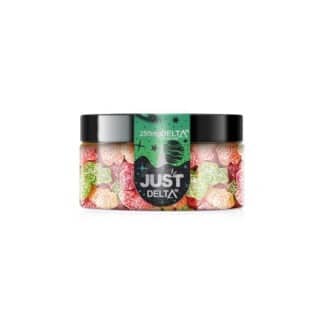
250mg Delta 10 THC Gummies Sour Bears
Sale! $17.99 Add to cart -

250mg Delta 10 THC Gummies Watermelon Rings
$24.99 Add to cart -
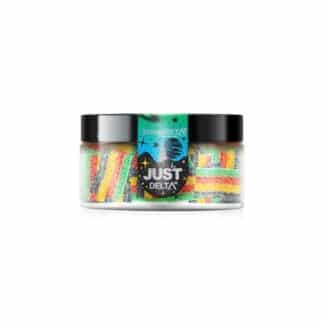
250mg Delta 10 THC Rainbow Belts Gummies
Sale! $17.99 Add to cart -
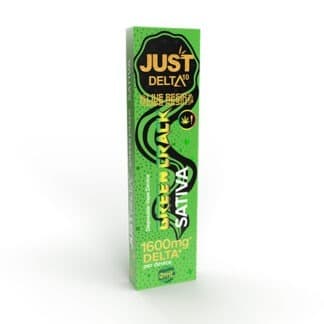
Delta-10 Green Crack Live Resin Sativa 1600mg 2g
$29.99 Add to cart -
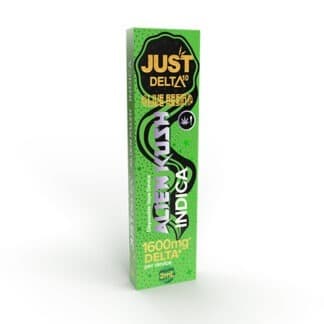
Delta-10 Live Resin Alien Kush Indica 1600mg 2g
$29.99 Add to cart
Delta-10 vs CBD
Unlike deltas 8, 9, and 10, CBD is not an isomer of THC and, as such, does not possess the same psychoactive properties. Instead, CBD is known to produce a calming, non-intoxicating effect.
Delta-10 and CBD also differ in their general usage–while individuals with low appetite, poor sleep, and muscle tension typically opt for delta-10, individuals who often deal with migraines and chronic pain tend to try CBD.
Additionally, it's interesting to note that CBD and delta-10 have an identical molecular structure, but with their atoms arranged differently from one another. As a result, the two cannabinoids provide different effects.
Types of Delta-10 for Sale
Although delta-10 is growing in popularity, it's still not the easiest to find, especially compared to the better-known CBD and delta-8.
But at JustDelta, innovation is our middle name; that's why you'll find some of the first delta-10 products in the entire market here.
We're currently working to fill our shelves with a wide assortment of products, but we already have the essentials here and ready to purchase.
Right now, we offer the following delta-10 products:
Delta-10 Gummies
As you might be thinking, delta-10 gummies are much like the gummy candies from your childhood.
But with these gummies, you'll be feeling a lot more than a sugar rush.
Delta-10 gummies are especially popular since they're not only a tasty treat but also offer a break from the daily hum-drum that's portable, easy to dose, and completely discreet.
Anecdotally, delta-10 gummies have gained a reputation for offering a high that's energizing and refreshing, especially compared to the more chill-inducing delta-8. However, delta-10's psychotropic effects are still less potent than delta-9, so users who tend to feel anxious from delta-9 may prefer delta-10's mild-mannered high.
If you're struggling to get over that 2 pm hump, delta-10 gummies could be the perfect pick-me-up: first, they provide that sweet starter, and in 30 minutes to an hour, they'll have you flying high while staying grounded.
As we've now established, delta-10 offers a more pleasant experience than delta-9, and like delta-10, it's about half as potent.
This means that if you're used to delta-9 and you'd like to have a similar experience with delta-10, it may be best to take your usual dosage of delta-9 and double the amount. This will probably be your best bet with delta-10.
With that in mind, though, remember that the effects of delta-10 will not be the same as delta-9, so always make sure you start slowly and pay attention to how you're feeling.
While there is no universal dosage, the typical starting point is 5-10 mg, but an absolute beginner may need even less, so their range may be more like 2.5-5 mg.
If you start out with a low dosage and you're not feeling anything, make sure to wait at least 30-60 minutes before taking more; it may take a while for the delta-10 to kick in, but when it does, it might hit harder than expected.
This is all to say, though, that it's essential to start your delta-10 in a way that allows you to observe its effects, so you don't want to take too high a dose.
While the evidence is still somewhat limited, delta-10 appears to be reasonably well-tolerated by users. But like other forms of THC, delta-10 may cause some temporary side effects, such as dry mouth, red eyes, a rise in appetite (aka, the munchies), and a feeling of intoxication.
Ultimately, everyone's body is different, but it's worth noting that such effects are more likely when higher doses of delta-10 gummies are taken.
Just like delta-8 and CBD, delta-10 is virtually unregulated, and the quality of delta-10 gummies is entirely up to the brand.
That's why shopping from a reputable manufacturer with a genuine passion for hemp is essential.
Keep an eye out for sellers that test their products through third-party labs for potency and purity. At JustDelta, all our lab reports are readily available on our website, and we're here to answer any questions you might have.
Delta-10 Disposables
Delta-10 disposables are one-and-done vapes that use e-liquid infused with delta-10. Vapes work to make delta-10 inhalable without the need for combustion, and they do so by heating up an e-liquid (also known as a vape oil) until it becomes a vapor, which is then inhaled through the vape's mouthpiece.
Disposables offer all of the benefits of your typical vape but do away with the chore of replacing your carts or recharging your battery.
While traditional vapes are made up of a cartridge and battery, disposables are one singular product that includes everything you need. And while it's true that your standard vape cart & battery is going to last longer, delta-10 disposables offer you convenience without the commitment.
Disposables are the perfect way for those who've never vaped since the straightforward design gives you more opportunities to explore different flavors and dosages. Your delta-10 disposable is filled and ready to go the minute you open it. And even better, you can just throw it away when you're done.
And you'll never feel bad about it because they're affordable compared to other cannabis products!
Delta-10 disposables are also great because they're incredibly portable and take up even less space than a traditional vape; plus, they offer that discretion we all love with our THC.
Using your delta-10 disposable will determine your overall experience, and we're here to ensure you have the best one possible.
First, you'll need to choose your disposable, keeping in mind your preference of flavor and strain profile.
But more importantly, consider the dosage you're going for and what overall effect you wish to achieve. An excellent general rule is to start slow, even if you have experience with other vapes like delta-8 or CBD.
When vaping your delta-10 disposable for the first time, try starting out with 2-3 puffs and gently exhale, while those who've been vaping for a while might need 5-6.
While delta-10 is by and large considered safe at this point, the conversation of safety tends to become skewed when it comes to vapes.
Though they make a highly bioavailable and effective way to enjoy THC, delta-10 disposables have been attached to some due to cases in which users were hospitalized after vaping black market disposables.
When shopping for delta-10 disposables, steer clear of the ingredients you're warned about with any vape, especially vitamin E acetate.
Vitamin E acetate is sometimes used for diluting vape juices, typically used to make disposables cheaper while maintaining an attractive-looking liquid.
However, vitamin E acetate has been attributed as a potentially dangerous ingredient in delta-10 disposables since it can severely interfere with your lungs' ability to exchange carbon dioxide with oxygen.
Also, avoid vape pens made with cheaper, lower-grade metals like chromium, nickel, manganese, and tin.
What to Look for in Delta-10 Products
If you're new to shopping for delta-10, you might be a bit unsure what to look for in a quality product.
When shopping for delta-10 products, the first thing to check is the company's reputation, which you should be able to pull up with a simple search online. Check for reviews on the brand not only on their site but also on outside forums, Yelp, Google, and Reddit.
Next, it's essential to check the ingredients in a delta-10 edible–of course, you'll need to do this if you have any kind of dietary restrictions or allergies, but it's also worth checking to check for plant-derived terpenes, as well.
It's also a good idea to consider the THC content in the edibles, especially when you're purchasing gummies, which should have a consistently measured dosage. The average THC content per gummy is between 20-25mg each.
Shop From Reputable Sources
As per the 2018 Farm Bill, delta-10 can legally be shipped by mail. Because of this, customers can find delta-10 products in several different retailers, whether delta-10 gummies, delta-10 disposables, or delta-10 cartridges. This heavily differs from marijuana, which individuals must buy from dispensaries in legal states. With new cannabinoids like delta-8 and delta-10, however, such restrictions aren't made.
As a result, delta-10 can be found in head shops, convenience stores, gas stations, bodegas, and other retail outlets.
This poses a double-edged sword–while customers may have an easier time finding delta-8 shots in their local area, these sources might not always be trustworthy. On top of that, employees at such establishments might not specialize in cannabis or delta-10, so their knowledge of products will be minimal.
Make sure to only purchase from reputable delta-10 sellers, and try sticking with manufacturers who've been in the cannabis game for years, even if it's for related products like CBD or delta-8.
Know Your Tolerance Level
When it comes to cannabis, the golden rule is this: you can always take more, but you can't take less.
With that in mind, starting with the recommended dosage as per the label is recommended, as well as giving the product plenty of time to kick in.
When you find that “sweet spot” of a dosage that gives you a feeling of well-being and relaxation, avoid increasing or decreasing it when possible. With delta-10 products, most customers start at around 10mg, depending on the product. However, you may find that a smaller or larger dose works better for you and your needs.
If you have experience with delta-9 THC, it's worth repeating that delta-10 is about half as potent, so your usual amount of delta-9 doubled may be an ideal starting point. Meanwhile, delta-8 is about the same potency.
Avoid Driving When Consuming THC
Remember that delta-10 is a mind-altering substance, and as such, users are urged to avoid operating heavy machinery or doing anything that might put them in harm's way.
Even if delta-10 provides a clear-headed high, users must understand they may still be impaired and should not drive for as long as they're feeling the effects.
Space Out your Dosage
Compared to delta-9, delta-10 has a reputation for being more milder. Still, excessive delta-8 may result in side effects like paranoia, lethargy, and anxiety.
Because of the potential for such side effects, users generally should space out their delta-8 shot doses by about 2 hours as they enjoy a light, clear-headed type of intoxication.
Delta 10 FAQs
Showing all 15 results







